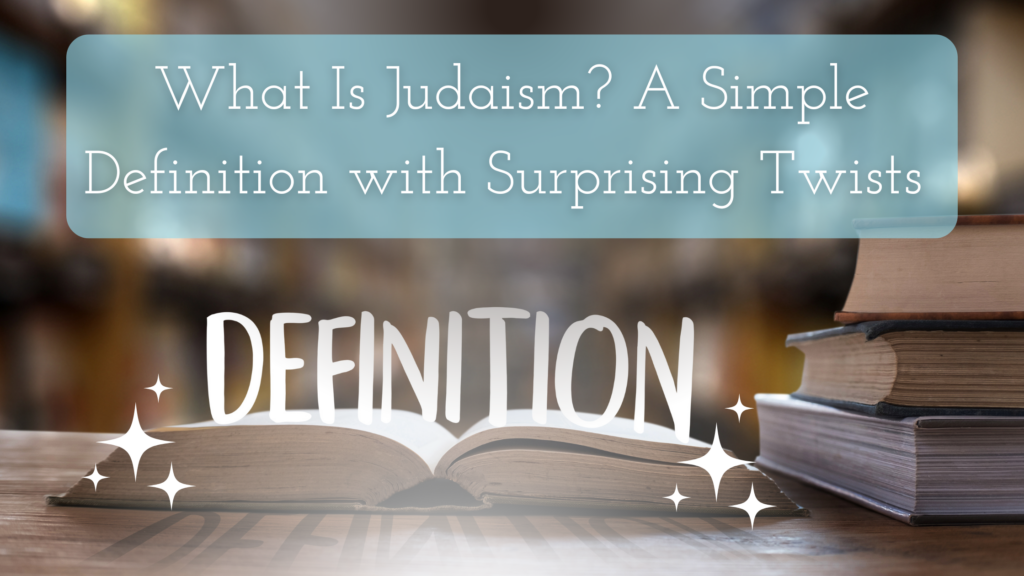
What Is Judaism? A Simple Definition with Surprising Twists 📚
People often describe Judaism as one of the world’s oldest monotheistic religions. But what does that really mean? How did it start, and why is it so significant? Let’s dive into the basics of the Judaism definition and uncover its story!
Judaism Defined: A Religion Rooted in History
Judaism traces its origins back to the Prophet Jacob (Ya’qoob, peace be upon him), also known as Israel. The Judaism that was prescribed by God revolved around the worship of God alone, with no partner or associate, and on the prohibition of worshipping anything or anyone else. But when it comes to rulings and the details of acts of worship, Islam differs from Judaism. As the Quran says, “To each among you, We have prescribed a law and a clear way” (Al-Maa’idah 5:48). This highlights that every nation has its unique guidance.
The Jewish people’s journey began in Palestine, with a notable detour in Egypt. Under the guidance of Prophets like Moses (Moosa, peace be upon him), they witnessed divine miracles and God gave them the Torah.
A Unique Law for a Unique Time
Unlike Islam, which is universal and timeless, Judaism’s laws were specific to the Children of Israel. For instance, dietary laws and rituals reflected their distinct identity. The Prophet Muhammad (peace and blessings of Allaah be upon him) beautifully summed this up: “The Prophets are half-brothers; their mothers differ but their religion is one.”
Over time, laws evolved to suit different eras. Did you know that Adam’s children could marry their siblings? Because it was not possible to produce offspring at that time in any other way. But by Moses’ time, God forbid such practices. These changes reflect the divine wisdom in tailoring laws to meet societal needs.
The Torah: A Text with a Tumultuous Past
Here’s a surprising twist: the Torah, as it exists today, isn’t the original revelation that God gave to Moses. It has been altered over time. This alteration is evident in discrepancies and contradictions within the text. As the Quran states, “They change the words from their places” (Al-Maa’idah 5:13).
For example, some stories in the Torah attribute major flaws to Prophets, such as claiming that Solomon (peace be upon him) worshipped idols. These claims contradict the belief in the impeccable character of all Prophets.
For more details on these differences, check out this article.
Judaism vs. Islam: What’s the Difference?
While both religions emphasize monotheism, the laws and practices differ significantly. Judaism’s laws were specific to a particular time and people, while Islam’s Shariah is universal and adaptable. As the final message, the Quran is preserved without any alterations, as Allah promises, “We have sent down the Dhikr (Quran), and surely, We will guard it” (Al-Hijr 15:9).
The Prophet Muhammad (peace be upon him) explained these differences beautifully, likening previous Prophets to brothers with different mothers but the same father – their core message was the same, but their laws varied.
A Lesson in Coexistence
Despite theological differences, Islam promotes respectful coexistence with Jews as long as they don’t transgress the sacred limits of the Muslims. During the Prophet Muhammad’s time, Jews lived peacefully in Madinah under agreements ensuring mutual rights. For instance:
- Freedom of religion: “The Jews have their religion, and the Muslims have theirs.”
- Protection and justice: The Muslims of Madinah guaranteed to defend their Jewish allies and treat them fairly in disputes.
Such examples of harmony are timeless lessons in fostering mutual respect.
Fun Fact: Why “Judaism”?
Unlike Islam, which means “submission to Allah” and isn’t tied to a person or place, Judaism gets its name from the tribe of Judah. This distinction highlights Islam’s universal scope compared to Judaism’s historical and tribal focus.
Final Thoughts: Why It Matters Today
Understanding the Judaism definition helps us understand that Islam is universal and suitable for all times and people until the Day of Judgment because the Quran remains the only unaltered revealed book. And Muslims are those who submits to Allah’s will, whether in the past, present, or future.
A Jewish boy used to serve the Prophet (blessings and peace of Allah be upon him) and he fell sick. The Prophet (blessings and peace of Allah be upon him) came to visit him. He sat by his head and said: “Become Muslim.” The boy looked at his father, who was also by his head, and his father said to him: Obey Abu’l-Qaasim (blessings and peace of Allah be upon him). So he became Muslim, and the Prophet (blessings and peace of Allah be upon him) left, saying, “Praise be to Allah Who saved him from the Fire.”.
Want to learn more about religious history and coexistence? Explore our blog for similar topics!



